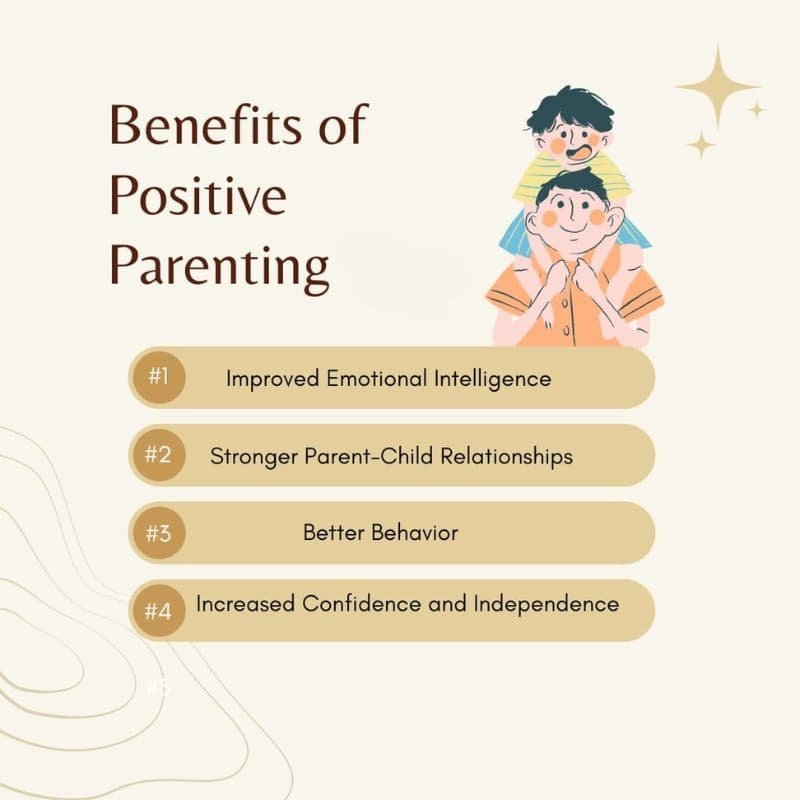Positive parenting is a powerful approach that emphasizes love, communication, and guidance over punishment. It aims to foster emotional growth, build strong parent-child relationships, and teach children how to navigate their emotions in healthy ways. In this article, we will explore the principles of positive parenting, offer practical strategies for implementation, and discuss the long-term benefits for both children and parents
What Is Positive Parenting?
Positive parenting focuses on nurturing a child’s emotional development and fostering a strong parent-child bond through mutual respect, empathy, and open communication. Unlike traditional discipline methods that rely on punishment or strict rules, positive parenting encourages parents to guide and support their children, helping them develop self-discipline, resilience, and emotional intelligence.

Key Principles of Positive Parenting
- Unconditional Love: Children need to feel loved and accepted, even when they make mistakes. Positive parenting emphasizes unconditional love and support to build a foundation of trust and security.
- Clear Boundaries: Setting consistent and clear boundaries helps children understand expectations and feel safe. Boundaries should be communicated in a firm but respectful manner.
- Positive Discipline: Discipline in parenting focuses on teaching rather than punishing. It encourages problem-solving, empathy, and understanding of consequences rather than instilling fear or guilt.
- Encouragement: Parenting involves encouraging children’s efforts and reinforcing their strengths. This fosters confidence, self-esteem, and motivation
Strategies for Implementing Positive Parenting
Implementing Parenting requires a shift in mindset and an intentional focus on communication, empathy, and teaching. Here are practical strategies to help you incorporate parenting into your daily interactions with your children.
1. Active Listening
One of the most important aspects of positive parenting is active listening. Children need to feel heard and understood. When they express emotions or concerns, give them your full attention. Avoid interrupting or dismissing their feelings.
How to Practice Active Listening?
- Get on their level: Physically get down to your child’s eye level when they are speaking to show that you are fully engaged.
- Acknowledge feelings: Validate your child’s emotions by saying things like, “I can see that you’re upset” or “It sounds like you’re frustrated.”
- Reflect and respond: Reflect back what your child has said to confirm your understanding and offer a thoughtful response. For example, “It seems like you’re feeling left out because your friend didn’t invite you to the party.”
Active listening builds trust and helps children feel valued.
2. Setting Clear and Consistent Boundaries
Parenting is not permissive. It involves setting clear, consistent boundaries that provide structure and safety for children. These boundaries help children understand acceptable behavior while giving them a sense of security.
Tips for Setting Boundaries
- Be clear and specific: Instead of vague rules like “behave yourself,” be specific about what behavior is expected. For example, “We speak kindly to each other in this house.”
- Follow through: Consistency is key. Once boundaries are set, it’s important to follow through with them every time. This helps children know what to expect and reduces confusion.
- Explain the reasons: Help your child understand why the boundary is in place. For example, “We hold hands when crossing the street because it keeps us safe.”
Setting boundaries with empathy ensures that children learn the reasons behind rules, rather than simply obeying out of fear.
3. Encouraging Emotional Regulation
Teaching children how to manage their emotions is a central part of parenting. Emotional regulation helps children navigate their feelings without resorting to tantrums or meltdowns.
Ways to Encourage Emotional Regulation
- Model healthy emotional expression: Children learn from their parents, so it’s important to model appropriate ways to express emotions. Show your child how to cope with anger, frustration, or sadness calmly and constructively.
- Teach coping strategies: Introduce your child to coping strategies like deep breathing, counting to ten, or using a “calm down” corner when they feel overwhelmed.
- Name the emotions: Help your child identify and name their emotions. For example, say, “It seems like you’re feeling frustrated because you can’t solve that puzzle.”
Over time, children will learn to identify and manage their emotions healthily.
The Benefits of Positive Parenting

Positive parenting is not only beneficial for the emotional and social development of children, but it also strengthens the bond between parents and children. Here are some of the key benefits:
1. Improved Emotional Intelligence
Children raised with positive parenting techniques tend to have higher emotional intelligence. They are better able to recognize, understand, and manage their emotions, which helps them navigate social interactions and form healthy relationships.
2. Stronger Parent-Child Relationships
The focus on open communication, empathy, Toddler Sleep Issues, and mutual respect fosters a strong and secure relationship between parents and children. This bond creates a safe space for children to express themselves and seek guidance when needed.
3. Better Behavior
Positive parenting encourages good behavior through understanding and respect rather than fear or punishment. Children are more likely to cooperate when they feel heard and understood.
4. Increased Confidence and Independence
By offering encouragement and allowing children to make decisions within clear boundaries, positive parenting fosters a sense of autonomy. Children learn to trust their abilities, make independent decisions, and face challenges with confidence.
FAQs About Positive Parenting
Positive parenting is not about permissiveness. It involves setting clear boundaries and holding children accountable for their actions while offering love, empathy, and guidance. It’s about teaching rather than punishing.
Start by focusing on communication. Begin by actively listening to your child, validating their feelings, and gradually shifting toward positive discipline techniques. It’s important to be patient with both yourself and your child as you transition.
Start by focusing on communication. Begin by actively listening to your child, validating their feelings, and gradually shifting toward positive discipline techniques. It’s important to be patient with both yourself and your child as you transition.
Yes, positive parenting principles can be applied to children of all ages. With older children and teenagers, the focus shifts toward collaborative problem-solving, mutual respect, and guiding them to make responsible decisions.
When your child breaks a rule, address the behavior calmly. Help them understand the consequences of their actions and work together to find a solution. Use the situation as a teaching moment rather than resorting to punishment.
Encourage intrinsic motivation by explaining why the rules exist and how following them benefits the child. Positive reinforcement, such as praise and acknowledgment of good behavior, helps children feel proud of their actions without relying on external rewards.
Conclusion
Positive parenting is about creating a nurturing environment where children feel loved, respected, and understood. By focusing on emotional development, setting clear boundaries, and encouraging open communication, parents can foster strong, trusting relationships with their children. The benefits of positive parenting extend far beyond childhood, setting the stage for lifelong emotional health, resilience, and confidence.


